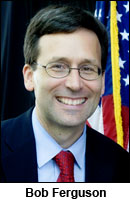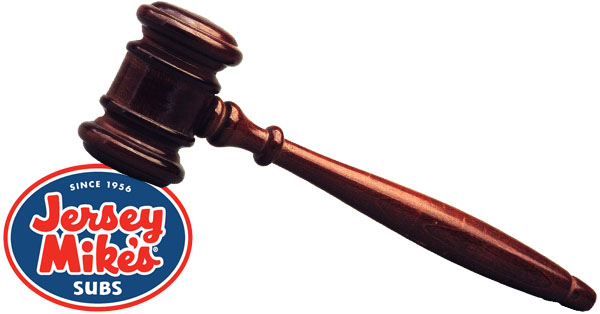STATE GOVERNMENT
AG’s initiative nixes no-poach clauses at national franchises
The following is from the Office of the Attorney General:
 OLYMPIA (June 17, 2020) — A report released Tuesday details Washington State Attorney General Bob Ferguson’s two-year investigation that has eliminated no-poach clauses in franchise agreements nationwide for every company that has three or more locations in Washington. As a result of Ferguson’s initiative to end the practice, which he launched in 2018, millions of workers at 237 corporate franchise chains across the country are now protected from no-poach clauses.
OLYMPIA (June 17, 2020) — A report released Tuesday details Washington State Attorney General Bob Ferguson’s two-year investigation that has eliminated no-poach clauses in franchise agreements nationwide for every company that has three or more locations in Washington. As a result of Ferguson’s initiative to end the practice, which he launched in 2018, millions of workers at 237 corporate franchise chains across the country are now protected from no-poach clauses.
No-poach clauses appear in franchise agreements between owners of franchises and corporate headquarters. The clauses prohibit employees from moving among stores in the same corporate chain, a practice that economists believe stagnates wages and limits growth opportunities. For example, the clauses would prohibit an employee at one Burger King location from accepting employment at another Burger King franchise location for higher pay. Importantly, employees had no knowledge of these agreements between franchisors and the corporate brand.
As a result of Ferguson’s initiative to eliminate no-poach clauses, 237 corporate franchisors, ranging from McDonald’s to Jiffy Lube, signed legally binding agreements to end no-poach practices nationwide, covering more than 4,700 Washington locations and nearly 200,000 locations around the country.
“Less than three years after reading an article in the New York Times about a problem affecting millions of franchise workers, my office stopped the use of no-poach clauses at 237 corporate franchise chains nationwide,” Ferguson said. “We not only helped Washington workers — we helped millions or workers across all 50 states. These clauses rigged the system against workers. My office set out to end this practice, and millions of workers are now protected from no-poach clauses.”
Ferguson’s initiative to eliminate no-poach clauses
 The initiative began with a September 2017 article in the New York Times titled “Why Aren’t Paychecks Growing? A Burger-Joint Clause Offers a Clue.” The article focused on the downward pressure no-poach agreements among fast-food franchises place on wages. After reading the article, Solicitor General Noah Purcell referred the subject to Ferguson. The article cited research by Princeton economists Alan Krueger and Orley Ashenfelter highlighting the harms to workers caused by the practice.
The initiative began with a September 2017 article in the New York Times titled “Why Aren’t Paychecks Growing? A Burger-Joint Clause Offers a Clue.” The article focused on the downward pressure no-poach agreements among fast-food franchises place on wages. After reading the article, Solicitor General Noah Purcell referred the subject to Ferguson. The article cited research by Princeton economists Alan Krueger and Orley Ashenfelter highlighting the harms to workers caused by the practice.
Professors Krueger and Ashenfelter examined franchise agreements for 156 of the largest franchise companies in the United States. The franchise agreements for companies with more than 500 locations operating in the U.S. were analyzed for any language “restricting the recruitment and hiring of employees from other units within the franchise company.”
The economists assert that “no-poach” clauses reduce opportunities for low-wage workers and stagnate wages, harming workers in Washington and across the nation.
In January 2018, Ferguson’s Antitrust Division launched an investigation into no-poach clauses. The Attorney General’s Office investigated the corporations on the economists’ list to determine which fast-food companies used no-poach clauses and were present and employed people in Washington. Out of the original restaurants the Antitrust Division contacted, three chains — Hissho Sushi, Long John Silver’s and Wendy’s — did not use no-poach provisions in their franchise contracts.
Ferguson negotiated an end to no-poach practices with 46 corporate chains in 2018, including McDonald’s, Anytime Fitness, Sport Clips and La Quinta.
In September 2018, Ferguson announced that he was expanding his investigation to industries beyond fast-food restaurants, starting with all the remaining companies on Krueger and Ashenfelter’s list. Ferguson also announced that he was beginning to investigate franchises that economists Krueger and Ashenfelter did not include in their analysis because they have fewer than 500 stores nationwide. The first chains outside of the restaurant industry to end no-poach practices included gyms, automotive services and convenience stores.
As a result of the expansion, more than 190 additional chains signed legally binding agreements to end no-poach practices.
Corporate chains that did not agree to end the practice faced a lawsuit from Ferguson’s office.

No-poach lawsuit
In October 2018, Ferguson filed his first and only no-poach lawsuit against restaurant chain Jersey Mike’s for its use of the clauses. Unlike dozens of other corporate chains, Jersey Mike’s refused to enter into a legally binding agreement to end these practices nationwide, and Ferguson filed a lawsuit against the company.
Ferguson resolved that lawsuit in August of 2019. In order to avoid trial, Jersey Mike’s agreed to eliminate no-poach clauses from all its corporate franchise agreements, and also paid the State of Washington $150,000. Had Jersey Mike’s agreed to Ferguson’s original offer, they would not have had to make any payment to the state.
Testimony before the U.S. House of Representatives
In October of 2019, Assistant Attorney General Rahul Rao testified before the U.S. House Judiciary Committee’s Subcommittee on Antitrust, Commercial and Administrative Law. U.S. Rep. Pramila Jayapal (D-WA, 7th) is a member of the committee.
In addition to other antitrust work of the office, Rao discussed the success of the anti-no-poach initiative. Rao shared the types of clauses the office has seen in companies across the nation, the effects these no-poach clauses could have on workers’ wages and opportunities, and the wide range of industries that use these practices.
For example, the office has found that across the many industries they have investigated, approximately 65 percent of corporate chains include no-poach provisions in their franchise contracts.
Jayapal praised the Attorney General’s Office for its initiative.
“One of the things I have appreciated about our state AG’s Office is that you don’t wait for people to come to you, you actually identify a problem … and then you act aggressively and pursue an enforcement strategy that has resulted in positive gains for millions of workers across the country.”
Written testimony for the Attorney General’s Office can be found here.
Attorney General’s Antitrust Division
Senior Assistant Attorney General Jonathan Mark and Assistant Attorneys General Eric Newman, Rahul Rao and Justin Wade of the Attorney General’s Antitrust Division led the no-poach initiative.
The Antitrust Division is responsible for enforcing the antitrust provisions of Washington’s Unfair Business Practices-Consumer Protection Act. The division investigates and litigates complaints of anticompetitive conduct and reviews potentially anticompetitive mergers. The division also brings actions in federal court under the federal antitrust laws. It receives no general fund support, funding its own actions through recoveries made in other cases.
The Antitrust Division investigates complaints about potential anti-competitive activity. For information about filing a complaint, visit https://fortress.wa.gov/atg/formhandler/ago/AntitrustComplaint.aspx.





